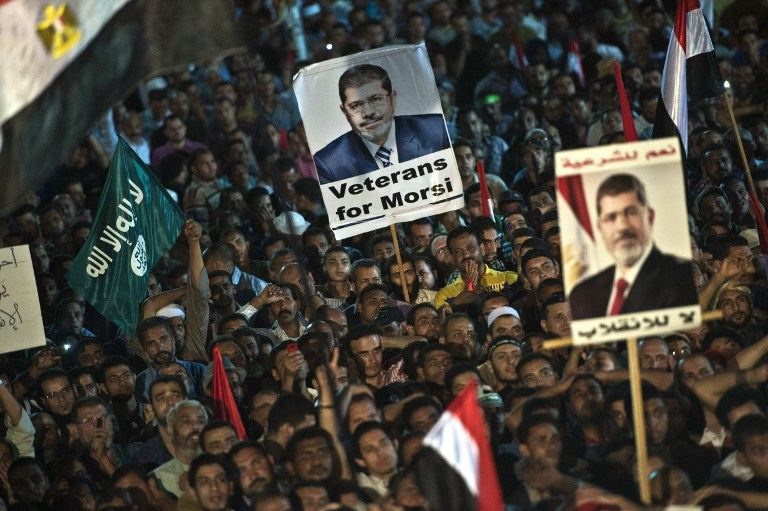SUMMARY
This is AI generated summarization, which may have errors. For context, always refer to the full article.

CAIRO, Egypt – One person was killed in Cairo as clashes erupted on Tuesday, August 13, between supporters and opponents of Egypt’s ousted president Mohamed Morsi, as tensions mounted ahead of a looming crackdown on pro-Morsi protest camps.
At least 10 people were also injured in the violence in Cairo’s Giza neighborhood, security officials told AFP.
A pro-Morsi march had taken off from Nahda square — site of one of two large sit-ins staged by Morsi loyalists — to Faisal Street in Giza where residents began to pelt the marchers with rocks.
The clashes rapidly escalated with birdshot fired from both sides, security officials said, as residents of the Giza neighborhood smashed the shopfront of a department store owned by Islamists.
Earlier in another area of the capital, police fired tear gas to break up clashes that erupted between Morsi loyalists and residents, AFP correspondents reported.
Dozens of religious scholars affiliated with Morsi’s Muslim Brotherhood had entered the religious endowments ministry and were ordered out by police prompting clashes, a security official said.
The violence comes after the expiry of a government ultimatum to dismantle the sprawling protest camps.
Morsi, Egypt’s first elected president, was overthrown by the military on July 3 with popular backing.
His supporters say nothing short of his reinstatement will persuade them to disperse.
The standoff with the army-backed interim government has sparked international fears of further bloodshed.
Clashes between pro- and anti-Morsi demonstrators and security forces have killed more than 250 people since the end of June.
Since police issued the latest warning last week to end the protests, the Islamists have repeatedly called for new demonstrations.
On Monday, the judiciary extended Morsi’s detention for a further 15 days pending an investigation into his collaboration with Palestinian group Hamas.
Morsi’s backers set as their rallying cry: “Together against the coup d’etat and the Zionists”, in an appeal to nationalist sentiment after a deadly air strike on militants in Egypt’s Sinai Peninsula, which the jihadists said was carried out by an Israeli drone.
Israeli media say the Jewish state has been cooperating closely with Egypt over the threat from Sinai militants.
Authorities have announced plans to clear the pro-Morsi protest camps from Cairo’s Rabaa al-Adawiya and Nahda squares by “gradual steps”.
But the number of protesters in the squares has not diminished.
At Rabaa, the bigger of the two rallies, dozens of volunteer guards manned makeshift barriers of bricks and sandbags.
The Muslim Brotherhood, the group from which Morsi hails, insist that their demonstrations are peaceful, while the government and the press accuse demonstrators at Rabaa and Nahda of being “terrorists”.
They say the protesters are hiding automatic weapons in the squares and using women and children as “human shields”.
The government has struggled to come up with a clear strategy to end the protests, its members split between those who want to send in the security forces and those who want a negotiated solution, in deference to international appeals to avoid further bloodshed.
Police and army chiefs are ready to intervene, but the reticence of some top politicians, such as vice-president and Nobel laureate Mohamed ElBaradei, has led them to take a more cautious approach.
Rabab al-Mahdi, professor of political science at the American University of Cairo, said the demonstrations “are not sit-ins like any others”.
Authorities “are dealing with the most organized political force in the country. They know that the cost will be higher than the dispersal of past protests,” Mahdi said.
The Muslim Brotherhood, banned in 1954 and repressed by successive governments, won both parliamentary and presidential elections in 2011 after the ouster of veteran strongman Hosni Mubarak.
The Brotherhood is demanding the release of Morsi and other top party figures who were detained by the military on July 3.
Prosecutors have set an August 25 date for the trial of the Brotherhood Supreme Guide Mohammed Badie and his two deputies.
While Egypt’s political transition, which is intended to lead to elections in early 2014, has struggled to get off the ground, Al-Azhar, Sunni Islam’s highest seat of learning, has called for national reconciliation talks.
Al-Azhar’s grand imam Ahmed al-Tayyeb said he had invited all sides in the crisis to negotiate a compromise, but the Brotherhood said it did not receive any invitation and categorically refuse to hold talks with the “illegitimate” authorities. – Rappler.com
Add a comment
How does this make you feel?
There are no comments yet. Add your comment to start the conversation.